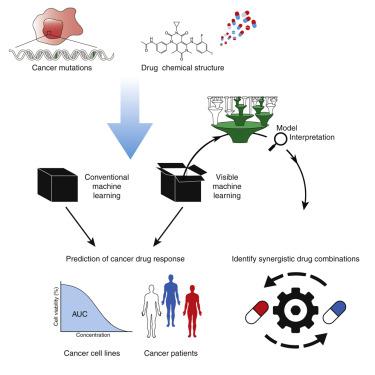Cancer Cell ( IF 50.3 ) Pub Date : 2020-10-22 , DOI: 10.1016/j.ccell.2020.09.014 Brent M Kuenzi 1 , Jisoo Park 1 , Samson H Fong 2 , Kyle S Sanchez 1 , John Lee 1 , Jason F Kreisberg 1 , Jianzhu Ma 3 , Trey Ideker 4

|
Most drugs entering clinical trials fail, often related to an incomplete understanding of the mechanisms governing drug response. Machine learning techniques hold immense promise for better drug response predictions, but most have not reached clinical practice due to their lack of interpretability and their focus on monotherapies. We address these challenges by developing DrugCell, an interpretable deep learning model of human cancer cells trained on the responses of 1,235 tumor cell lines to 684 drugs. Tumor genotypes induce states in cellular subsystems that are integrated with drug structure to predict response to therapy and, simultaneously, learn biological mechanisms underlying the drug response. DrugCell predictions are accurate in cell lines and also stratify clinical outcomes. Analysis of DrugCell mechanisms leads directly to the design of synergistic drug combinations, which we validate systematically by combinatorial CRISPR, drug-drug screening in vitro, and patient-derived xenografts. DrugCell provides a blueprint for constructing interpretable models for predictive medicine.
中文翻译:

使用人类癌细胞的深度学习模型预测药物反应和协同作用
大多数进入临床试验的药物都失败了,这通常与对药物反应机制的不完全理解有关。机器学习技术为更好的药物反应预测带来了巨大的希望,但由于缺乏可解释性且专注于单一疗法,大多数技术尚未达到临床实践。我们通过开发 DrugCell 来应对这些挑战,这是一种可解释的人类癌细胞深度学习模型,训练有素的 1,235 种肿瘤细胞系对 684 种药物的反应。肿瘤基因型诱导细胞子系统中的状态,这些状态与药物结构整合以预测对治疗的反应,同时了解药物反应背后的生物机制。DrugCell 预测在细胞系中是准确的,并且还可以对临床结果进行分层。对 DrugCell 机制的分析直接导致协同药物组合的设计,我们通过组合 CRISPR、体外药物筛选和患者来源的异种移植系统对其进行系统验证。DrugCell 为构建预测医学的可解释模型提供了蓝图。


























 京公网安备 11010802027423号
京公网安备 11010802027423号